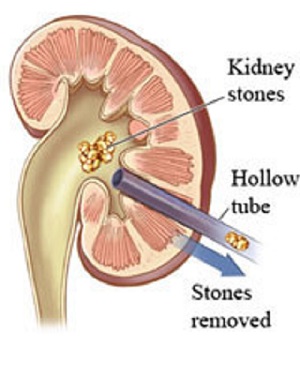TUL

Definition
A tube called a stent that carries urine from your kidneys to your bladder. Until kidney stone is in the kidney, it has no pain usually but when it passes out from kidney and come to stent, intense pain is started in a person's flank which is called kidney colic. This pain is often periodic and be with nausea. If the size of kidney stone be the small, it may be pass out with patient or drug. But if its size be large and not pass out after two or four week with patient or drug, usually needs lithotripsy. Remaining stone in stent for a long time and obstruction of the stent pass, often led to non-working of same side kidney. Lithotripsy is a procedure that uses shock waves to break up stones in the kidney, bladder, or ureter.
Types of Lithotripsy
Extracorporeal shock wave lithotripsy (ESWL) is the most common type of lithotripsy. "Extracorporeal" means outside the body.
Litholopaxy is a surgical tool, is used for passing out stone from bladder without opening it. Finally, small pieces of kidney stone pass out through urine. In ESWL, extracorporeal shock wave focuses on stone in order to break it up. In TUL method Pneumatic the waves break the stones into tiny pieces then, tiny pieces pass out through spray or with urine.
In this treatment method, general anesthesia method or waist numb is applied. Also, it may be injected antibiotic to patient. Maybe doctor anaesthetize patient and he (she) feels no pain.
During this surgery, flexible tube called a stent may be placed through your back or bladder into your kidney. This tube will drain urine from your kidney until all the small pieces of stone pass out of your body. This may be done before or after your lithotripsy treatment.
Lithotripsy is a procedure that uses shock waves to break up stones in the kidney, bladder, or ureter (tube that carries urine from your kidneys to your bladder).
Lithotripsy is usually no side effect method but often are causing:
- Bleeding from kidney and need to receiving blood
- Kidney infection
- Obstruction of some parts of kidney by stone pieces that makes intense pain and kidney hit
- Ulcer in the stomach or small intestine

Before the Procedure
Always tell your health care provider:
- If you are or could be pregnant
- What drugs you are taking, even drugs, supplements, or herbs you bought without a prescription
During the days before the surgery:
- You will be asked to stop taking blood thinners such as aspirin, ibuprofen (Advil, Motrin), warfarin (Coumadin), and any other drugs that make it hard for your blood to clot. Ask your provider when to stop taking them.
- Ask your provider which drugs you should still take on the day of the surgery.
On the day of your procedure:
- You may not be allowed to drink or eat anything for several hours before the procedure.
- Take the drugs you have been told to take with a small sip of water.
- You will be told when to arrive at the hospital.
After the Procedure
- After the procedure, you will stay in the recovery room for up to about 2 hours.
- Most people are able to go home the afternoon of surgery day or the next day of the surgery. day of their procedure. You will be given a urine strainer to catch the bits of stone passed in your urine.

Cares after discharge
Use doctor prescribed antibiotics for avoiding infection until the end.
Feeling slight pain in flank, slight irritation in urine and seeing a bit blood in patient urine are normal after procedure but if the pain is intense you can use calming drugs.
You can take shower from the day after the procedure and do daily works
Walking and easy activity is enough normally for helping passing stones out, too running, jumping up and down, Roping and hard work out don't help passing out stones.
Sexual activity is ok from the day after TUL
It's better to increase drinking liquids a bit
Consult certainly in the Stent exit time
Nutrition diet for kidney stone patients:
- Drink a lot, drink liquids regularly so that to have about 2 L urine
- Use meat a bit
- White and red meat don't have any difference in making stone
- Using dairy normally is useful
- Use less salt
- Use less Oxalate foods, such as: Dark tea, Soda, Chocolate, Spinach, Nuts and so on.
Visit the doctor whenever see any of following symptoms:
- Fever
- Several puking
- Intense stomach pain
- Stop urinating
References
- medlineplus.com/2017
ISO 9001 Certification for Quality Management System &
Certification of Iran National Hospital Accreditation with Excellent Grade
Teaching Patients about
TUL
Prepared by: Quality Improvement, Education and Research Office
Voice Costumer Service (For Complaints, compliments and comments)
SMS: 30001845
Pursuance: Hospital Management
Add: Iran, Mashhad, Shahid Mofatteh Street, Vahid Street, Vahid 3 Alley.
Phone: 32877001




